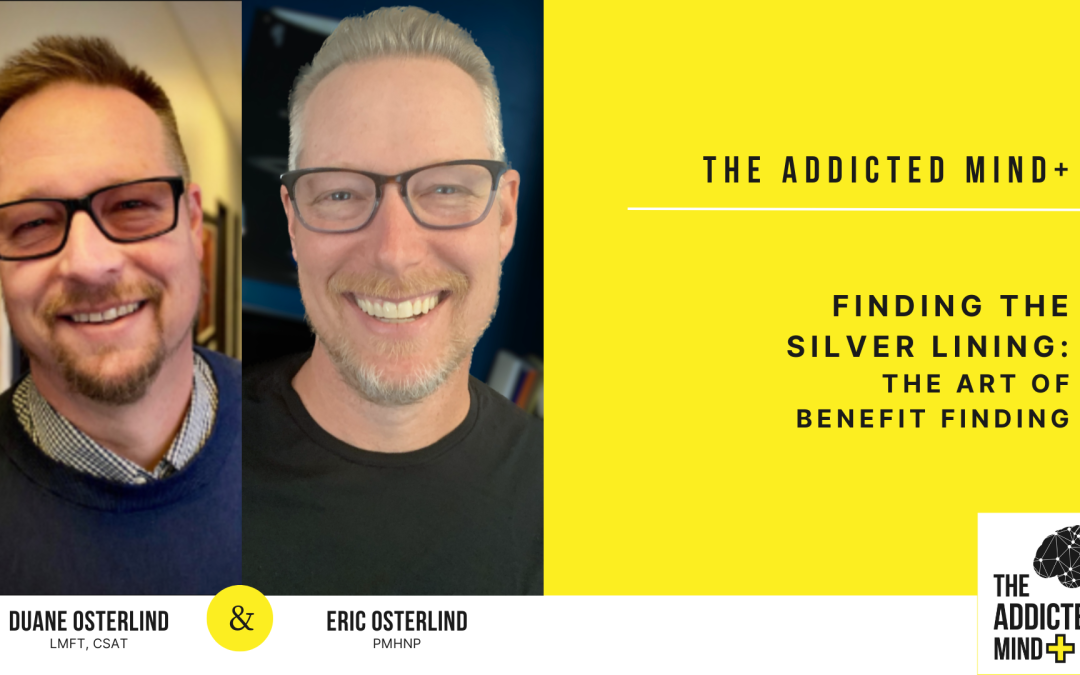Worksheet: Growth & Gratitude Journal Prompts
What if the experiences that broke you could also be the source of your greatest strengths?
It’s a radical question, especially when you’re standing in the aftermath of addiction and trauma, surrounded by what feels like nothing but devastation and regret. But what if within that rubble, there were seeds of profound growth waiting to be discovered?
In this powerful episode of The Addicted Mind Plus, hosts Duane Osterlind and Eric Osterlind explore the transformative concept of benefit finding and post-traumatic growth. This isn’t about pretending the past wasn’t painful or toxic positivity that dismisses real suffering. Instead, it’s about learning to hold two truths at the same time: your pain was real and devastating, AND you can grow stronger because of how you navigated through it.
The episode tackles a pain point many in recovery face: feeling permanently defined by the worst things that have happened to you. When you look back and see only a wasteland of mistakes, regrets, and broken pieces, it becomes incredibly difficult to build a hopeful future. That narrative of victimhood and brokenness can feel impossible to escape.
Duane and Eric introduce the concept of post-traumatic growth (PTG)—significant positive psychological change that comes not from the traumatic event itself, but from the struggle with that event. Think of it like a forest fire: the fire is devastating, but the struggle for survival can lead to new, significant growth in the ecosystem afterward.
The hosts identify five key areas where people often experience growth after trauma: improved relationships with deeper, authentic connections; new possibilities and opportunities that weren’t visible before; a greater sense of personal strength and resilience; spiritual development and a broader sense of meaning; and a deeper appreciation for life and gratitude for things once taken for granted.
Throughout the episode, Duane and Eric emphasize the critical importance of validating pain before exploring growth. You can’t skip over the hurt to get to the healing. As Duane explains, you have to sit with the pain and acknowledge it’s real before you can discover the benefits—but you don’t have to stay in that pain forever.
The episode offers two gentle, reflective exercises for listeners. The first invites you to identify one personal strength—like resilience, empathy, patience, or determination—that has been significantly enhanced because of what you walked through. The second is a journal prompt: “What is one important lesson I’ve learned about myself, about others, or about life through this journey so far?”
These reflections help reframe the narrative of your life. As Eric powerfully states, you stop being just the victim of your past and become the person who faced immense challenges and found strength and meaning in the struggle. This doesn’t change what happened, but it can change what it means to you today.
Duane shares one of his favorite quotes from Viktor Frankl’s “Man’s Search for Meaning”: “When we are no longer able to change a situation, we are challenged to change ourselves.” That’s the heart of this work—changing ourselves in response to what we’ve endured and finding real purpose in that transformation.
To support listeners in this gentle process of exploration, Duane and Eric have created a free Growth and Gratitude Journal Prompts worksheet, available in the show notes at theaddictivemind.com.
This episode is a compassionate invitation to look at your past through a new lens—not one that erases the pain, but one that helps you discover the unexpected gifts that emerged from your struggle. If you’re in recovery and wrestling with feelings that your past is only a story of damage, this episode offers hope and a path forward.
Key Topics
- Post-Traumatic Growth (PTG): Understanding how significant positive change can emerge from struggling with major life crises and traumatic events
- The Importance of Validating Pain First: Why you must acknowledge and sit with pain before you can discover the benefits and growth that followed
- Five Key Areas of Growth: Exploring improved relationships, new possibilities, personal strength, spiritual development, and deeper life appreciation
- Holding Competing Truths: Learning to acknowledge that an experience was 100% painful while simultaneously recognizing the growth that came from navigating it
- Reframing Your Life Narrative: Shifting from a story defined by damage to one of growth, resilience, and meaning
- Practical Reflection Exercises: Two actionable steps for identifying strengths gained and lessons learned through adversity
- Viktor Frankl’s Wisdom: Applying the principle that when we can’t change a situation, we’re challenged to change ourselves
Timestamps
[00:01:00] – Opening question: What if the things that broke you could be your greatest strengths?
[00:03:00] – The pain point: Feeling permanently defined by your past damage and mistakes
[00:05:00] – Introduction to Post-Traumatic Growth (PTG) and how growth comes from the struggle, not the event
[00:06:00] – The five key areas where people experience growth after trauma
[00:08:00] – Actionable Step 1: Reflect on one strength you’ve gained or enhanced through your struggle
[00:10:00] – Actionable Step 2: Journal prompt – What have I learned about myself, others, or life?
[00:11:00] – Viktor Frankl quote and closing thoughts on transformation and the free worksheet resource
Follow and Review: We’d love it even more if you could drop a review or 5-star rating over on Apple Podcasts. Simply select “Ratings and Reviews” and “Write a Review” then a quick line with your favorite part of the episode. It only takes a second and it helps spread the word about the podcast.
Supporting Resources:
If you live in California and are looking for counseling or therapy please check out Novus Mindful Life Counseling and Recovery Center
We want to hear from you. Leave us a message or ask us a question: https://www.speakpipe.com/addictedmind

